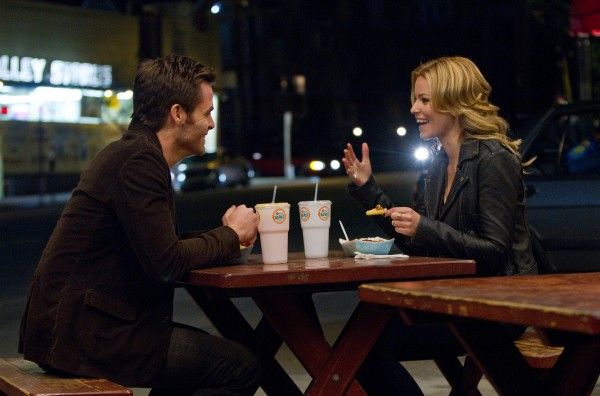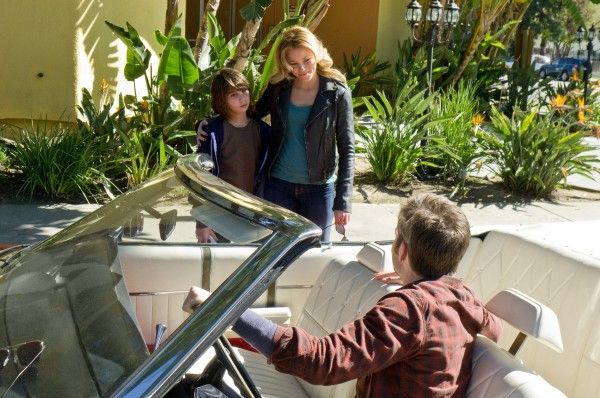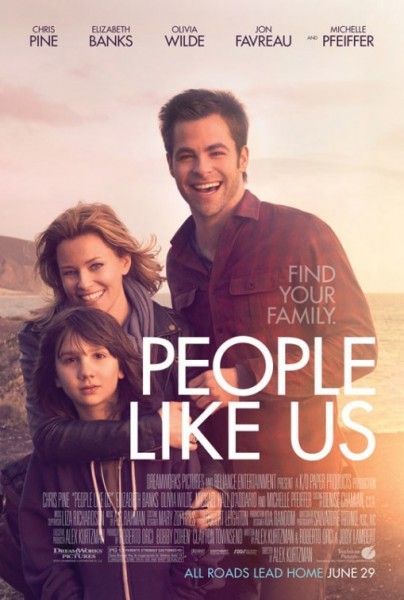People Like Us is a family dramedy inspired by true events from the life of writer/director Alex Kurtzman. The story follows Sam (Chris Pine), a twenty-something guy who learns that his father has suddenly died, leaving behind a secret 30-year-old daughter (Elizabeth Banks) that Sam never knew about, and he is forced to re-examine his own life and re-think everything he thought he knew about his family.
At the film’s press day, Collider got the opportunity to speak with singer/songwriter Liz Phair, who co-wrote the end credits song, “Dotted Line,” with composer A.R. Rahman. During the interview, she talked about taking on the male rock establishment 20 years ago, how her music was initially received, making the leap to writing songs for film and TV, getting the call from director Alex Kurtzman to contribute a song to People Like Us, collaborating with composer A.R. Rahman, how comfortable she is now with performing live, what makes a great show for her, and what she had coming up, musically. Check out what she had to say after the jump.
Collider: When you first decided to take on the male rock establishment 20 years ago, did you have a goal in mind? Did you have any idea that things would turn out how they did?
LIZ PHAIR: No, it was a total accident! I was trying to take on the neighborhood. That I was super clear about. There were a bunch of rock stars in the neighborhood and I was a barfly. Everyone thought I was too suburban. I remember even getting kicked out of a bar once because I was too loud and obnoxious. That’s how bad it was. Urge Overkill and Material Issue, and a ton of other bands, were hanging out in the Wicker Park, Chicago scene, and I remember having a real empowerment moment where they treated me like I was either going to be a girlfriend or, “Just shut up and let us rule the radio.” And I remember thinking, “Fuck you! Fuck you! Fuck you!”
At Oberlin, I’d been the girlfriend of the guys in bands, but I’d always played an instrument so I just didn’t think what they did was that fucking hard. So, I had a real desperate moment. I was completely out of money. I didn’t want to get a real job. I didn’t want to go home to my parents. That always breeds a heroic spirit. So, what I was focused on was making a record that would shut the neighborhood up and make them have to take me seriously. And then, it went much further than that and I was playing catch-up for the next 15 years. I had never played live. I had no experience. I had bitten off way more than I could chew.
Were you surprised that the reaction that you got and how shocked some people were with some of your more sexual lyrics?
PHAIR: Totally! I think it was context. Context has a lot to do with it. Oberlin is a very progressive school. Lesbians were the top of the social structure. It’s an inversion of America. They basically encouraged all your self-expression, in its most raw and primal form. So, I had just come out of four years of feeling like women were awesome and we were great. But then, back in the guy world of Guyville, I wanted to be cute and popular and have the guys like me, but I also had this other spirit inside me that was like, “I have something to say. You should take me seriously.” I was struggling with that. My record was designed to shock in a way that was context specific. They would have understood what I was talking about and they would have known when they were getting knocked, but they wouldn’t have been as horrified as mainstream America was, when this suddenly was picked up by all the critics’ polls. People who were used to listening to Natalie Merchant were suddenly listening to me and they were like, “What the fuck is this?!” Context made a tremendous difference to how that record was perceived.
Could you ever have imagined that you’d make the leap to writing songs for TV shows and movies?
PHAIR: No! I don’t think anything I do in life is planned. Sometimes I regret that and I feel like I try to take ahold of the wheel, but I’m also always super excited when things pop up spontaneously and when I’m a little bit out of my depth. I just find that that thrills me. Since it’s legal and it’s not super self-destructive, I’m like, “Okay, that’s what you like in life.” I like when things surprise me. Everyone wants to get into soundtracks. Everyone wants to do songs here and there. But, I think they want it for different reasons. I think I’m just tumbling through my life, enjoying playing with everybody.
How did People Like Us come about? Did you just get a call from writer/director Alex Kurtzman?
PHAIR: Yeah, the director, who’s the writer as well, emailed me. He got in touch with me and said, “Hi, I’m a fan. I’ve been writing this movie that’s very personal and I listened to your music when I was writing the female character, Frankie. I used your music to help me understand how she felt. Maybe you can be a part of this movie somehow. Would you like to come meet?” So, I met him and he had just finished the script, so he gave me the script. It was fun and it was great to talk, but we didn’t really know what we were going to do. That’s not normally how it works in Hollywood. Normally, they’re like, “We need a song. What’s on the radio right now, how much does it cost, and will it work in the film?” This was so personal.
A year later, they had a cut, so I went in and saw the cut, and I sobbed in the back. But, we still didn’t know what we were going to do. And then, A.R. Rahman became a part of it after another six months, he was like, “Come in. We need your voice. Just put your voice on something and get in this movie.” So, I did. It was easy and fast. A.R. was a prince and fielded these balls that Alex was throwing at him. It was fun because, when I walked in, they were in the thick of it. I’ve been scoring TV for a couple years now, so I totally got what they were doing and what A.R.’s position was and what Alex was looking for. I played around with them, watching them score, and I remember A.R. being like, “Thank god, you’re here!” He was ready to tell Alex, “Okay, let it go! That scene works!”
I can’t remember how it happened, but he was like, “Can you write a song for the end credits?” A.R. had this theme that he’d woven throughout a lot of the cues that was this beautiful lullaby theme because Alex wanted something that had a lullaby feel to it. The song I wrote for the movie was a little tougher, so marrying the two was interesting and it worked beautifully. It was better than I would have thought. You can hear it in the song. It doesn’t sound like a Liz Phair song, and it doesn’t sound like an A.R. Rahman song. It sounds like the two of us coming together, which is a very satisfying feeling because you’ve created something out of nothing.
Has this inspired you to collaborate with other people?
PHAIR: Oh, yeah! I’m all about that. I love that. I love being mature enough. When I was younger, I would be like, “That’s not what I wrote! You can’t get rid of the bridge!” I didn’t have my identity enough. Young kids don’t have their identity, so everything is so important. Now I’m mature. I know who I am and I know what my thing is and I know what I’m bringing. It’s very clear and defined. I’m put a million facets on it. It’s here. And then, I can collaborate so much more easily because I can actually see the moving parts. When you’re young, you don’t even know who the fuck you are. You haven’t chiseled that mountain out. Those feelings are so intense. You’re pissed and crying. I just wrote with this young girl. Poor thing, it was our first time co-writing and I just had to be so gentle. She really was feeling everything. I was like, “Could you maybe go over to here or there,” and I could hear her thoughts like, “What do you know?! You weren’t that successful!” It’s so hard, when you’re young. When you’re older, the joy is meeting another creative soul and making something new.
Are you comfortable now, when you’re performing live on stage? What makes a great show for you?
PHAIR: That’s a great question! I am comfortable performing now. I love it! But, it’s hard for me to switch modes from being a writer at home. If you said, “Your tour starts September 1st,” I’d start freaking out about that now. I’d be like, “What am I doing? I don’t know how to do this! I don’t remember my songs! I’m a trained monkey!” And then, when I get on, I’m like, “Fuck, I totally now how to do this!” What makes a great show, I shit thee not – it sounds cliche, but it’s absolutely true – is the interplay. The final consummation between it going out to the people, and the people bringing it back to you, is a great show. You cannot have a great show without that. You can have a good show. You can play better than ever. Music is sound. It’s a wave. It’s going out and coming back, and it’s bouncing off. That has to occur. With a shitty show, there’s no interplay. It’s just a fact. I’ve done enough shows now to tell you, straight up, it’s the interplay between the audience and the performer. It’s like sex.
What’s coming up for you, musically?
PHAIR: Well, I’m writing a new record, and I’m very excited about the songs that I’ve been writing. I don’t want to get my fans excited, but I feel like I’m writing stuff that’s more like the older material. I’ve come full circle, in a way, and I think part of that was divesting from a major label and that corporate thing. That kind of killed me. I got pissed off and stuck in a rut. Finally, it’s floating again. I know what I love about music and I know why I was always in it, so I’m very excited.



